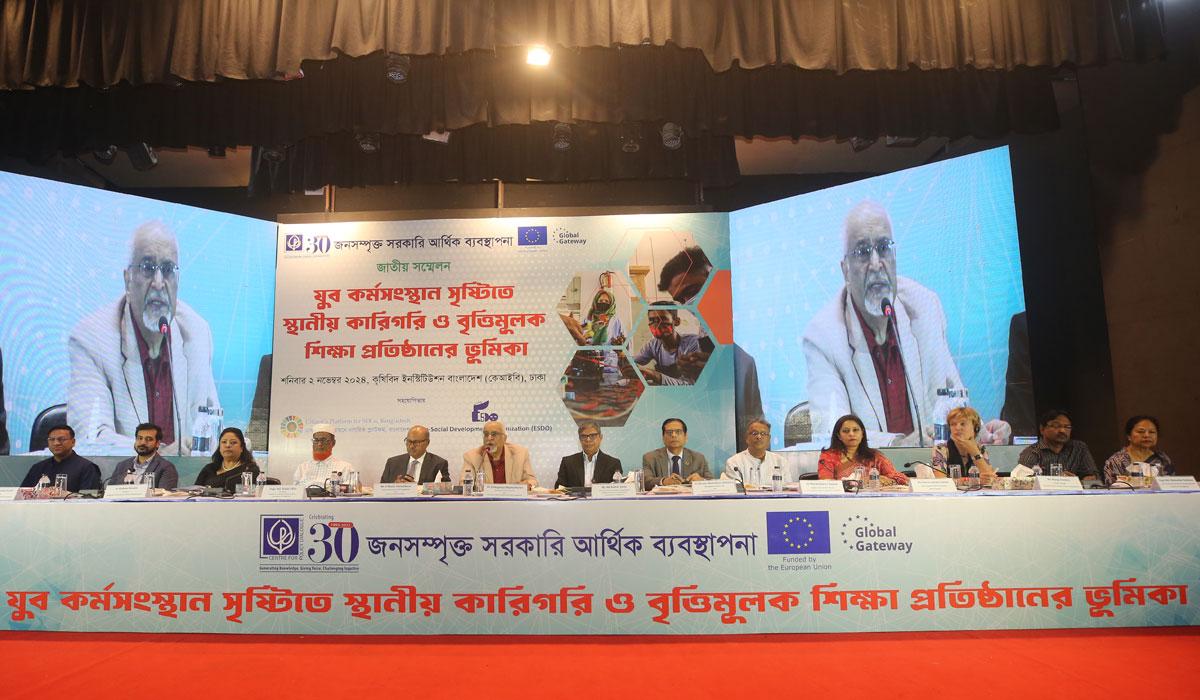
Dr Debapriya Bhattacharya, Distinguished Fellow, CPD and Convener, Citizen’s Platform recommended the formation of a high-level committee to develop a strategy and work plan to modernise and transform Bangladesh’s technical education system.
Speaking at the national conference on Creating Youth Employment Opportunities: Role of Technical and Vocational Education and Training (TVET) Institutions, held in Dhaka on 2 November 2024, he highlighted the pivotal role of technical education in achieving the country’s development aspirations.
The event, organised by the Centre for Policy Dialogue (CPD) and the European Union in collaboration with the Citizen’s Platform for SDGs, Bangladesh, and the Eco-Social Development Organization (ESDO), brought together experts, policymakers, and industry leaders to discuss the challenges and opportunities in this sector.
Bangladesh’s technical education landscape faces significant challenges, including outdated curriculums, inadequate laboratory facilities, and a severe shortage of skilled instructors. Findings from social audits conducted in Panchagarh, Sunamganj, and Satkhira revealed a disconnect between training programmes and market demands. The situation has further been exacerbated by societal stigma surrounding technical education, particularly affecting female students, leading to declining participation rates.
Mr Towfiqul Islam Khan, Senior Research Fellow at CPD, highlighted in his keynote presentation that 63 per cent of former TVET students earn less than BDT 10,000 per month due to a mismatch between their skills and market requirements.
He also emphasised the absence of a centralised student database, which has allowed inefficiencies such as duplicate registrations. Despite these issues, the Senior Research Fellow expressed optimism regarding the growing demand for skilled workers in international markets and called for aligning TVET programmes with global labour needs.
Experts at the conference stressed the urgent need to overhaul curriculums to better align with industry demands. Dr Md Shahid Uz Zaman, Founder of ESDO, pointed out ‘Resources are not accessible and decent empowerment opportunities are scarce, especially for the Leave No One Behind (LNOB) communities’. He also highlighted that training programmes are not aligned with current market demands and that non-government TVET institutions lack funding’.
Similarly, Ms Marga Peeters, Project Manager, Delegation of the European Union to Bangladesh, stressed that creating meaningful employment opportunities for young people is one of the pressing challenges. She noted that employment for youth is the foundation for sustainable growth, social inclusion, and stability, and TVET has been and remains a critical area of cooperation for the Union.
The issue of gender disparities in technical education was another focal point of the discussions. Dr Rubina Husain, President of the Bangladesh Federation of Women Entrepreneurs (BFWE), emphasised the limited access to information for women, which exacerbates their underrepresentation in TVET programmes. She advocated for awareness campaigns and dedicated platforms to publicise training and employment opportunities.
Ms Novera Ayesha Zaman, Vice President (NGO Partnership) of Bkash Limited added ‘Women often demonstrate higher skill levels than men but face significant barriers to employment due to systemic challenges and societal attitudes’.
The government’s role in addressing these issues was scrutinised during the conference. Md Maksudur Rahman, Director of the Directorate of Technical Education, noted that only 18 per cent of teaching positions in technical institutions are currently filled, leaving an 82 per cent shortfall. Efforts are underway to recruit teachers and expand infrastructure, with 300 new training centres planned.
However, Professor Mustafizur Rahman, Distinguished Fellow at CPD, cautioned against focusing solely on infrastructure without addressing instructor quality and curriculum relevance. He emphasised the need for strategic investments in training programmes designed to meet the demands of future job markets.
Private sector engagement emerged as a critical solution to bridging the gap between training and employment. Mr Abrar Hossain Sayem, President of the Bangladesh Apparel Youth Leaders Association, stressed the importance of involving businesses in the development of training programmes, particularly by fostering essential soft skills such as communication and teamwork.
Mr Md Rakib Ullah, Chairman, Bangladesh Technical Education Board, underscored the need to increase the number of skilled instructors and develop training courses based on local demand.
Mr Md Ruhul Amin, Secretary, Ministry of Expatriates’ Welfare and Overseas Employment, suggested that if private enterprises specify their requirements for skilled labour, training institutions can adjust accordingly, increasing both the quality and supply of skilled personnel.
Mr A Matin Chowdhury, Former Chairman, UCEP Bangladesh and Former President, Bangladesh Textile Mills Association (BTMA), echoed this sentiment, urging private companies to articulate their workforce needs more clearly to enable technical training institutions to tailor their programmes accordingly.
In his concluding remarks, Dr Debapriya Bhattacharya reiterated the need for a high-level committee to lead the transformation of the technical education system. He advocated for public-private partnerships and increased investment in skilled human resources to meet the evolving demands of the labour market.
During the open floor discussion, participants called for societal acceptance of TVET, the establishment of quality assurance mechanisms, and a centralised strategy to align training with market needs.
The conference underscored the urgent need for comprehensive reforms in Bangladesh’s technical education system. By addressing the identified challenges and implementing strategic changes, the country can unlock its youth’s potential, paving the way for sustainable growth and greater social inclusion.


